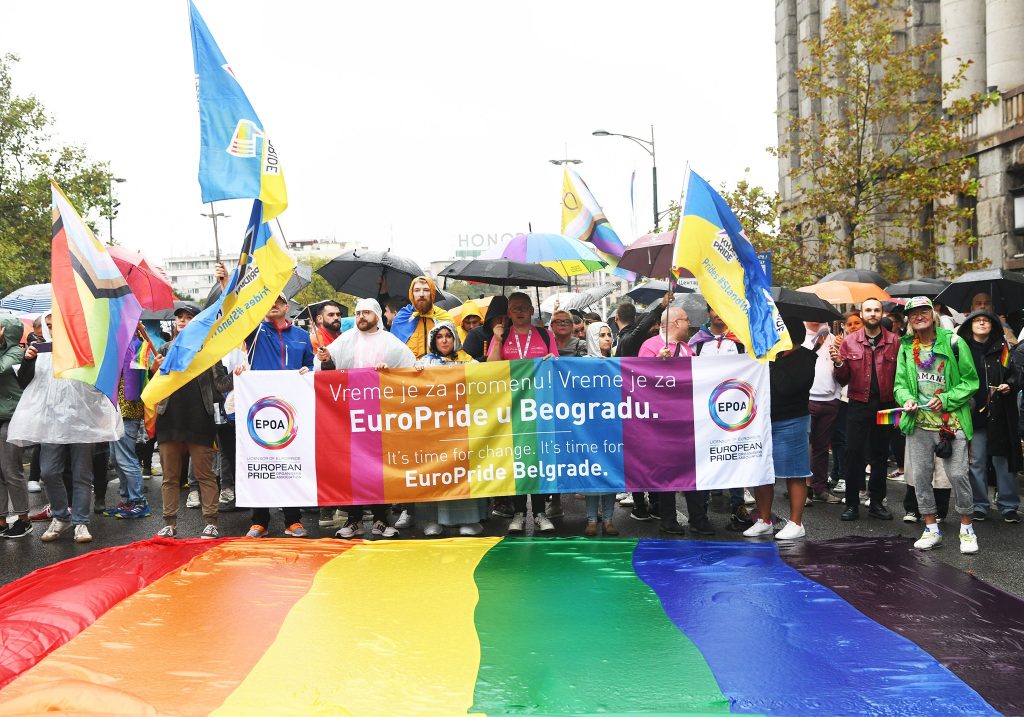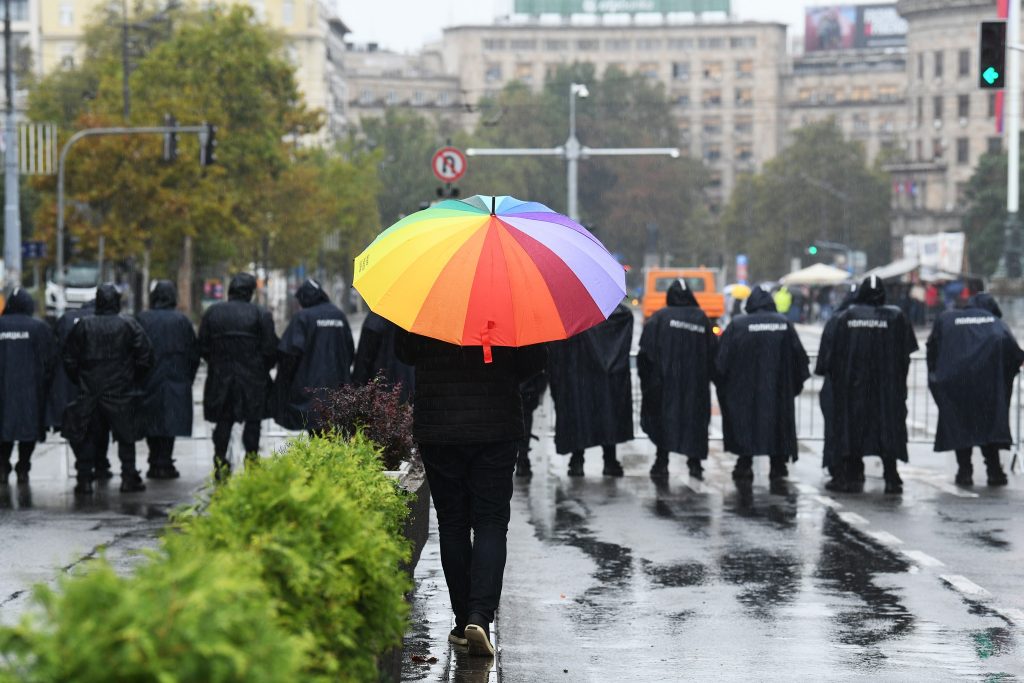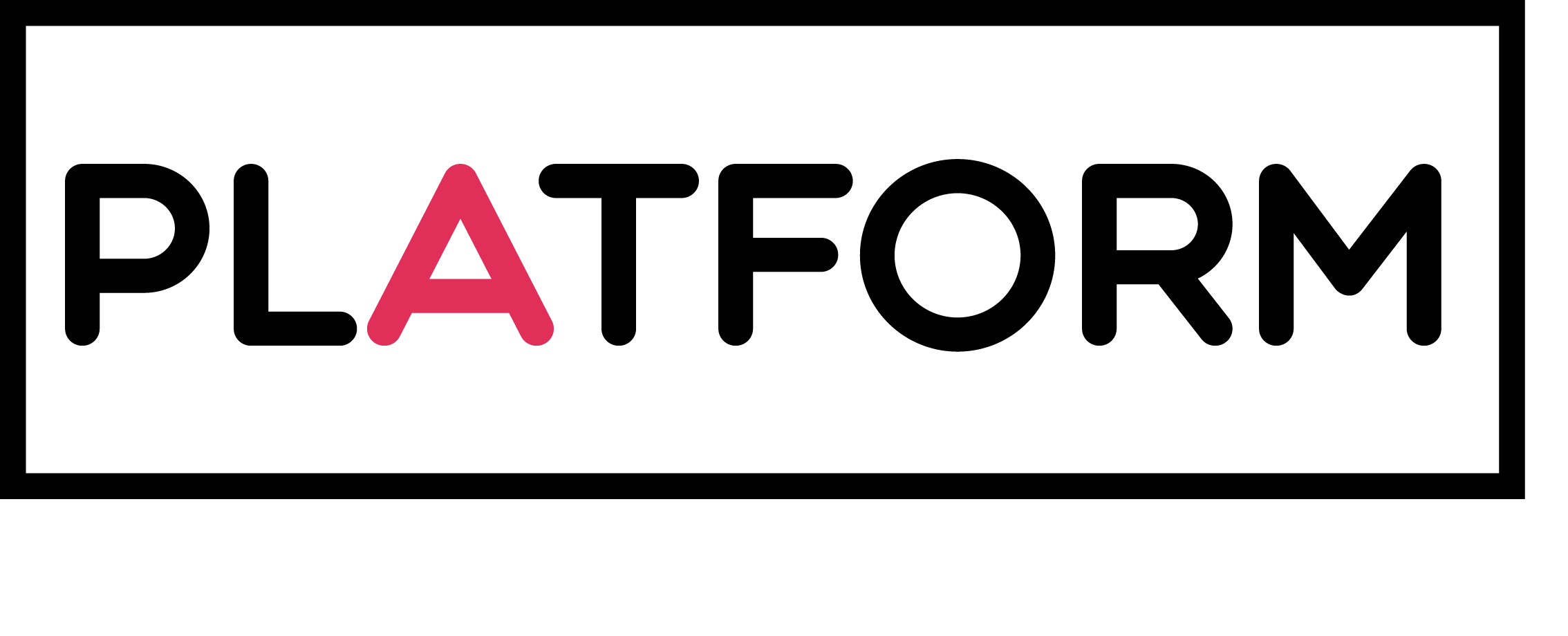The First EuroPride in the Balkans: Why it might take more than a walk to address LGBTIQ+ rights in Serbia
On the afternoon of September 13, when President Aleksandar Vučić announced that EuroPride 2022 was officially banned by the police, protesters gathered in the center of Belgrade and loudly demanded, “We want Pride!”. Only 96 hours before the event would take place, LGBTIQ+ activists headed to the Human Rights Conference to protest against the government’s decision and pressure Prime Minister Ana Brnabić to honor a promise she made two years earlier: that Serbia would be the first country in the Balkans to host the Pan-European LGBTIQ+ event. However, as it would become clear that week, even if EuroPride took place as expected in the end, it also happened amid international criticism, generalized uncertainty, security concerns, confusing messages from the Serbian government, and heavy policing.
Talks by the Serbian government to call off EuroPride had already started as early as August 27. When Vučić announced that the event would be canceled or postponed due to increased political tensions with Kosovo, right-wing threats, and economic crisis, Serbia took over international headlines.
Notwithstanding disapproval from European Union institutions and the organizers’ claims that this would breach previous decisions of the Constitutional Court, a few days later, Vučić maintained that EuroPride’s ban would be enforced and warned against defying the State’s decisions. On the same occasion, Ana Brnabić was re-appointed as Prime Minister of the Government of Serbia. Five years after the first appointment, Brnabić will continue her mandate as the first openly lesbian woman to become head of government in the country and one of the very few in the world.
The following weeks were marked by continuous disagreements between LGBTIQ+ activists, international stakeholders, and the Serbian government. In this scenario, numerous organizations from Western Europe manifested their solidarity with Belgrade Pride and supported their decision to go ahead with the event. However, general uncertainty around the walk lasted until just a few hours before the gathering, when Ana Brnabić finally announced that the event would be allowed and that the police would safely protect participants. Following a new route and entry points, surrounded by a police cordon, the few thousands who attended the parade marched to the concert venue where the event would continue.
During a Press Conference in the evening, the Prime Minister proudly talked about how the parade took place and how the government proved Serbia to be “a serious country that keeps its word, trusts and respects its institutions and respects all citizens”. However, with winter on Europe’s doorstep, Brnabić finished her speech by saying the government should now focus on “more important and bigger things”.
Rather than a concession from the government, the walk was a victory for the LGBTIQ+ people who attended the parade and for Belgrade Pride, who incessantly worked for the event to take place. However, the ongoing tensions that seized the political environment before EuroPride uncovered how unsafe LGBTIQ+ people still are and how fragile the achievements on the grounds of sexual orientation and gender identity (SOGI) remain in Serbia.
In fact, the conditions under which EuroPride took place may be a reminder of the challenges local LGBTIQ+ people still face regarding everyday visibility and freedom of expression in Serbia. What is worse, they might also remind us that it will take more than a walk to truly advance human rights and democracy in the Balkan region.

Unlike Brnabić’s statement after EuroPride, the government’s narrative for the past months not only resonated with the increase of hate speech and violence against LGBTIQ+ people but also revealed that visibility and the right of peaceful assembly are only limited to some. While the Serbian government claims to be committed to protecting LGBTIQ+ rights as it seeks membership in the European Union, it also turned a blind eye to right-wing supporters who were getting increasingly vocal as they called for violence against EuroPride participants and often harassed people on the grounds of their sexual orientation and gender identity.
Indeed, numerous right-wing supporters rallied in Belgrade on the same day of the walk to counter-protest and violently disrupted EuroPride, which resulted in multiple arrests by the police. What is worse, several LGBTIQ+ activists were brutally attacked after the march took place. According to a witness among them, the police did nothing to intervene or prevent the attack despite being nearby at the time.
Far from new, Serbia has a long-term history of widespread violence against LGBTIQ+ people, which increases but is not limited to when Pride takes place. On this note, concerns were already raised by organizations such as Amnesty International, ILGA-Europe, and UN bodies over the past years. Unsurprisingly, previous Prides in 2009, 2011, 2012, and 2013 were canceled due to violent threats from homophobic groups, and 2014 onwards, they only happened under heavy police security.
Since then, the Serbian government has not portrayed Pride Parades as a commitment to LGBTIQ+ equality and access to justice but as a mere obligation in terms of respect for legal norms and part of the criteria to be fulfilled for EU accession. Although Ana Brnabić’s appointment in 2017 repercussed in international expectations of a leap towards LGBTIQ+ rights in the country, they remain marginal to this day: cite a few, the Law on Same-Sex Unions as well as same-sex adoption and recognition of trans parenthood are still to be approved and implemented.
In 2020, the European Agency for Fundamental Rights reported that 71% of Serbian respondents still avoided holding hands in public with a same-sex partner for fear of being assaulted, threatened, or harassed. According to Ana Mirkailo, a volunteer at Belgrade Pride, the lack of safety of EuroPride is also a reflection of everyday experiences lived by LGBTIQ+ people: “I think [Vučić’s statement] also presents the controversy of our general safety in public places. Because if we are not protected one day in a year, how could we expect to be protected for the rest of the year?”
The threats became particularly evident during the weeks that preceded the parade, when thousands joined rallies from far-right political parties and condemned the pan-LGBTIQ+ event, urging it to be banned. Among those who attended, Boško Obradović, leader of the far-right wing opposition party Dveri, referred to the gatherings as not only against “Euro-NATO Pride” but also in support of Russia, and “the preservation of Kosovo and Metohija as part of Serbia”. On the same token, members of the Orthodox Church appealed to EuroPride’s ban as they called the event a threat to traditional family values and claimed it would desecrate the “holy city of Belgrade”. The same trend was also present in social media, where attacks targeting LGBTIQ+ people on the occasion of Pride multiplied over the past weeks.
While these rallies were running free in the streets of Belgrade, one may wonder, how was it the case that calling for violence against LGBTIQ+ people could publicly happen without any response from the state? What is worse, how to make sense of Vučić’s removal of LGBTIQ+ people from the public sphere while street protests by far-right wing groups can recurrently take place without any obstacles? Facing this dilemma, EU stakeholders considered Vučić’s EuroPride banning decision not only a violation of LGBTIQ+ rights but also a severe backlash on democracy and human rights in the country. Indeed, as reported by Graeme Reid, director of Human Rights Watch, the government’s consistent claim that it was unable to provide safety to the event’s participants would mean not only a surrender to threats and unlawful violence but also its implicit sanctioning of those.
Unsurprisingly but equally frustrating was the Prime Minister’s support of Vučić’s decision by arguing that the current priority was to ensure the country’s “peace and stability”. Far from new, Brnabić’s blind approval of the President sparked criticism from LGBTIQ+ people, especially since she would be expected to advocate for LGBTIQ+ rights on every basis. To illustrate this, Helena Vuković, a long-term trans activist in Serbia, explained: “if you want to have a state, you must have executive power, you must have an assembly, and also a president. When you have all that in one man, this is a problem: there is no democracy, it is an autocracy. When he says something, everyone does as he said”.
Vučić’s mentioning of tensions in Kosovo as another source of pressure on authorities to justify the banning of EuroPride follows the same authoritarian trend. This is further complicated by the war in Ukraine, which resonates in Southeast Europe due to Serbia’s close relationship with Russia and its refusal to acknowledge Kosovo as independent. Therefore, ongoing fears from the European Union and the United States that there might be a conflict spillover in the Balkans pressured the Serbian government to reach a compromise as soon as possible. Right after this happened, public attention to the agreement was overtaken by the boom of news about EuroPride’s cancellation.
In this regard, EuroPride organizer Marko Mihailović suggested that the pan-European LGBTIQ+ event cancellation attempt was being used as a political tool to divert attention from the recent deal with Kosovo. On a similar note, Ana Mirkailo also criticized the government’s double standards in its safety discourse: “[the majority of people] would like for Kosovo to be in the first place and just neglect EuroPride, but actually those are pretty intertwined”. Mirkailo also added how an intersectional perspective should be considered when it comes to LGBTIQ+ people’s safety since those with multiple identities face higher degrees of discrimination and are more exposed to violence, especially minorities in Kosovo.
An intersectional perspective must also be considered regarding the visibility of LGBTIQ+ people in Serbia’s current political environment. Among them, trans people have been facing a particular increase in violence and hate speech, often stemming from ring-wing parties such as the one led by Boško Obradović. This is despite the advancements made by the Serbian legislation when it comes to trans rights: for instance, Helena Vuković explained that in 2019, an amendment to a law was implemented, and determined that one “can change their gender mark, their name and their [citizens] number before operation, after one year of hormone therapy. That is a small victory, we need more, but it is easier now to change documents, which is imperative for the existence of trans persons in transition.”

While legislation change is undoubtedly relevant to the access to justice for LGBTIQ+ people, the same goes for its implementation in civil society. As reported by Geten Center for LGBTIQ+ Rights and Transgender Europe, not only have legal frameworks been poorly implemented, but there has also been a growing effort from nationalist politicians and anti-gender movements to connect LGBTIQ+ rights to political ideologies. In Vuković’s words, by associating rights on the grounds of SOGI with political and ideological trends, the government ignores that “our problem, the LGBTIQ+ problem, is a human rights problem, and that’s the point. Not ‘are you left or right oriented in politics’ and everything. We are all of that, you know?”
This narrative is particularly concerning given Serbia’s previous ratification of the United Nations Universal Declaration of Human Rights and the European Convention on Human Rights. As reported by the European Pride Organizers Association, holding Pride is considered a fundamental human right, and any attempt to ban it would be a breach of four different articles from the Convention. Moreover, it would also constitute a violation of decisions from the Serbian Constitutional Court. As pointed out by Marko Mihailović, since the previous Pride bans were already deemed unconstitutional, a similar move for the current event would call for an appeal from organizers on the grounds of Serbia’s legal framework.
These tensions around EuroPride show that the walk was neither the outcome of achievements by LGBTIQ+ organizations nor a milestone toward LGBTIQ+ equality. Instead, it took place in an artificial setting, where public visibility of LGBTIQ+ people was an exception but still not a right.
As the executive director of ILGA-Europe, Evelyne Paradis, stated, the parade was actually instrumentalized by the Serbian government, which managed to portray itself as Queer-friendly despite its strong LGBTIQ+-phobic rhetoric since the beginning. It is still to be seen whether EU institutions will end up falling for the narrative that Serbia is indeed making progress in LGBTIQ+ equality, given that despite the confusion, the walk went on. However, at the same time, the concerning growth of anti-gender, far-right and Eurosceptical movements in the Western Balkans must not be overlooked, let alone ignored.
Undeniably, the parade was still an achievement for those who fought for their rights to gather in public and protest. However, ERA maintains that there’s still a long road toward achieving complete freedom of assembly and expression in Serbia and the region. In view of equality and justice as non-negotiable matters which must be prioritized, especially during economic and political crises, the Serbian government must do more to ensure the safety of LGBTIQ+ people and the protection of LGBTIQ+ rights in the country.
As such, upholding such rights should be respected regardless of which party is in power. For the reasons above, ERA emphasizes the urgency of tackling violence and hate speech against LGBTIQ+ in Serbia and the Western Balkans so that visibility would not be restricted to a day of the year but an everyday reality where fundamental rights are respected and protected.
Clara Lhullier (she/her), Volunteer at ERA: Clara was a volunteer at Belgrade EuroPride 2022 and is currently a MA Student in International Relations at the University of Bologna, Italy. She researches lesbians in politics and LGBTIQ+ activism in the (Post-) Yugoslav Space and Brazil.


